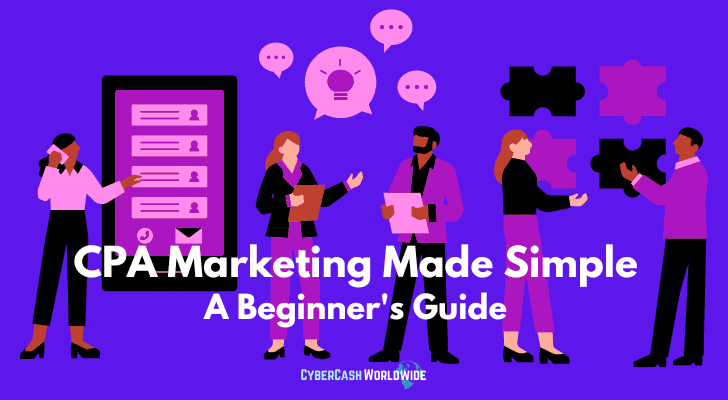Are you interested in earning money online through CPA marketing but don't know where to start? Here's a beginner's guide to CPA marketing for you. Whether you're brand new to making money online or have some experience with affiliate marketing, this guide will hopefully give you a little bit of knowledge to succeed.

What is CPA Marketing?
CPA marketing is an online advertising model in which advertisers pay publishers (also known as "affiliates") for clicks on or conversions of their advertisements. The concept of CPA is simple: You get paid when someone clicks on your ad and takes the desired action, such as making a purchase or filling out a form.
CPA marketing is an effective way to reach your target audience and can be a cost-effective alternative to other forms of online advertising, such as CPC (cost-per-click) or CPM (cost-per-thousand impressions). CPA allows you to pay only for the desired action, so you can be sure that your advertising budget is being well spent.
With CPA marketing, you can choose to advertise on a variety of platforms, including websites, mobile apps, and social media. You can also target specific demographics, interests, and even locations. When done correctly, CPA marketing can be a powerful tool to grow your business.
What's the Difference Between CPA and PPC?
CPA (Cost-Per-Action) marketing and PPC (Pay-Per-Click) advertising are both popular forms of digital advertising, but they differ in several ways.
Payment model:
The main difference between CPA marketing and PPC advertising is the payment model. In CPA marketing, advertisers only pay when a specific action is completed, such as a sale or a lead form being filled out. In PPC advertising, advertisers pay each time a user clicks on their ad, regardless of whether or not they complete a desired action.
Targeting:
Both CPA marketing and PPC advertising offer targeting options, but the methods differ. CPA marketing often involves targeting specific demographics or interests to generate qualified leads, while PPC advertising allows businesses to target specific keywords to reach users who are actively searching for products or services.
Conversion tracking:
CPA marketing typically involves more advanced conversion tracking, as businesses are paying for specific actions to be completed. This can allow for a more accurate measurement of ROI and the effectiveness of different advertising campaigns. In PPC advertising, conversion tracking is also important, but the focus is more on clicks and website traffic.
Risk:
CPA marketing carries less risk for advertisers, as they only pay when a desired action is completed. PPC advertising, on the other hand, can be riskier, as advertisers pay each time a user clicks on their ad, regardless of whether or not they complete a desired action.
CPA marketing and PPC advertising can both be effective ways of promoting products or services, but they have different payment models, targeting options, and levels of risk. It's important for businesses to consider their goals and budget when deciding which approach to take.
The Different Types of CPA Offers

There are different types of CPA offers that you can choose from. Each offer has its own set of rules and regulations. Here is a brief overview of the different types:
1. Cost per action/acquisition:
This is what CPA stands for, therefore the most common type of CPA offer. You will be paid for every action that your target audience takes. For example, if you are promoting a product and someone buys it through your link, you will earn a commission.
2. Cost per lead:
In this type of CPA offer, you will be paid for every lead that you generate. A lead can be defined as a sign-up form submission, newsletter subscription, or any other action that indicates interest in the product or service that you are promoting.
3. Cost per sale:
This is effectively the same as "cost per action (acquisition), but some marketers or offer networks use the abbreviation "CPS". You will be paid a commission for every sale that is made through your link. The commission percentage will vary depending on the product or service being sold.
4. Cost per click:
CPC, or PPC (pay per click) - you will be paid for every click that is made on your affiliate link. The amount that you earn per click will depend on the terms of the offer and the company that is running it.
Supercharge Your AWeber Account
Take Your Email Marketing To The Next Level With These Powerful Tools
Can Affiliate Marketing Really Be Used in CPA Marketing?
Yes, affiliate marketing can be used in CPA marketing. In fact, affiliate marketing is a common method for promoting CPA offers.
In affiliate marketing, publishers or affiliates promote products or services on behalf of advertisers and earn a commission for each sale or lead generated. CPA marketing is a form of affiliate marketing where the commission is paid based on a specific action, such as a sale or a lead form being filled out.
Many affiliate networks and platforms specialize in CPA marketing and offer a wide range of CPA offers for publishers to promote. Publishers can use a variety of marketing channels, such as email marketing, social media advertising, or PPC advertising, to drive traffic to the advertiser's website and generate conversions.
CPA marketing offers several advantages for publishers in affiliate marketing, including:
- Predictable income: Publishers can earn a predictable income based on the commission rate for each CPA offer they promote.
- Performance-based model: Publishers are incentivized to generate high-quality traffic and conversions, as this can lead to higher commissions and increased earnings.
- Targeted traffic: CPA marketing allows publishers to target specific audiences, which can result in more qualified leads and higher conversion rates.
Overall, affiliate marketing and CPA marketing can be a powerful combination for businesses looking to promote their products or services and drive sales.
Pros and Cons of CPA Marketing
As with any marketing strategy, there are both pros and cons to CPA marketing. On the plus side, the marketing model can be a very effective way to reach your target audience. It can also be a very cost-effective way to market your business since you only pay when someone takes action (such as signing up for a free trial or making a purchase).
On the downside, it can sometimes be tricky to get right. If your offers are not well-targeted or your ads are not well-designed, you may end up paying for clicks that don’t convert into customers. Additionally, some people may find CPA offers intrusive or annoying, which could lead them to avoid doing business with you altogether.
Here's a summary of the pros and cons of CPA marketing:
Pros:
Cons:
How to Get Started with CPA Marketing

CPA marketing is a great way to make money online. It's simple, and it can be quite profitable if done correctly. Here's a quick guide on how to get started with CPA marketing:
- Find a good CPA network. There are many different networks out there, so you'll need to do some research to find one that's reputable and offers good commissions.
- Sign up for an account with the network. Once you're approved, you'll be given access to their various campaigns.
- Choose a campaign that interests you and start promoting it! You'll need to generate traffic to the offer page to earn commissions.
- Keep track of your results and adjust your approach accordingly. If you're not seeing the results you want, try adjusting your strategies or choosing different campaigns.
CPA Marketing Tips for Beginners
As a beginner in the world of CPA marketing, you may be feeling overwhelmed and not sure where to start. But don't worry--we've got you covered! Here are some tips to help you get started with CPA marketing:
- Choose an offer wisely. Choose one that is relevant to your target audience and will convert well. Do your research and talk to other CPA marketers to find out what's working for them.
- Create a strong landing page. Your landing page is where users are directed to when they click on your link. Make sure it's well-designed and includes all the relevant information about the offer.
- Promote your offer creatively. There are endless ways to promote an offer, so get creative! You can use social media, email marketing, blog posts, or even traditional advertising methods like print or TV ads.
- Keep track of your results. It's important to keep track of your results so you can see what's working and what's not. Use a tracking platform like CPVLab to help you do this easily and accurately.
Popular CPA Networks
The best network for you will depend on your niche. If your business niche is very rare, targeting a specific group of people, I don't think CPA networks are idea. With that said, here are some of the most popular and reputable networks:
- MaxBounty: MaxBounty is a well-established CPA network that offers a wide range of CPA offers across various verticals, including dating, finance, and health. They also provide a user-friendly interface and excellent support for publishers.
- Perform[cb]: Perform[cb] is a CPA network that offers a wide range of offers across various niches, including health, wealth and financing, as well as education. They also provide excellent support for publishers and offer competitive payouts.
- CPA Grip: CPA Grip offers a wide range of CPA offers in multiple verticals, including finance, gaming, and e-commerce.
- CrakRevenue: CrakRevenue specializes in adult and dating offers, and has a large selection of high-paying CPA offers in these niches.
- CPAlead: CPAlead is a CPA network that specializes in mobile offers, including app installs and mobile subscriptions. They offer a variety of ad formats, including pop-ups, interstitials, and mobile content lockers.
- AdWork Media: AdWork Media is a CPA network that offers a range of offers across various niches, including make-money-online, health, finance, and travel. They offer competitive payouts, excellent support for publishers, and a variety of payment options.
They all have;
- Plenty of types of offers are available.
- Good payout rates and terms.
- Good support for publishers as well as advertisers.
- Fairly good reputation among users.
CPA Marketing and Scams

CPA marketing can be susceptible to scams, just like any other industry. Scammers may try to exploit the CPA marketing model by using fraudulent tactics to generate fake leads or actions, resulting in payouts for actions that did not actually occur. This can lead to a waste of resources for both advertisers and affiliates and can damage the reputation of the CPA marketing industry as a whole. Some common CPA marketing scams include:
- Fake leads: Scammers may use fake or bot-generated leads to artificially inflate their earnings. These leads may not result in any real action or value for the advertiser.
- Click fraud: Scammers may use bots or fake traffic to generate clicks on ads, resulting in inflated earnings for the affiliate and wasted ad spend for the advertiser.
- Misleading offers: Some CPA offers may be designed to mislead or trick users into taking certain actions, such as entering personal information or downloading software.
To avoid falling victim to CPA marketing scams;
- Work with reputable CPA networks and advertisers.
- Be cautious of any offers that seem too good to be true or that require you to engage in shady or fraudulent tactics.
- Always read the terms and conditions carefully and ensure that you understand the requirements for payouts and actions.
If you do encounter a scam in the CPA marketing space, report it to the relevant authorities as well as the network to help prevent others from falling victim to the same scam.
Is CPA Marketing Necessary?
No, CPA marketing is not necessary for every business, but it can be a useful tool for driving specific actions, such as lead generation or product sales.
The marketing method can be effective for businesses that look to build an email list or drive sales of a particular product. By paying only for completed actions, businesses can ensure that they are getting a return on their investment and targeting qualified leads.
But there are other digital marketing strategies available, such as social media advertising, content marketing, email marketing, and SEO.
Ultimately, the decision to use CPA marketing will depend on how you want to reach your target audience and achieve your desired results. It may be helpful to experiment with different methods and track your results to determine what works best for your business.
CPA Marketing Made Simple: A Beginner's Guide - Final Words
CPA marketing is a great way to get started in the world of online advertising. With this beginner's guide, you now have a better understanding of how CPA works and what you need to do to make it work for you. I recommend starting by focusing on testing different offers, building an audience, and improving your website's user experience.
Follow these basic steps and you'll soon be on your way to becoming a successful CPA marketer. Hopefully.

